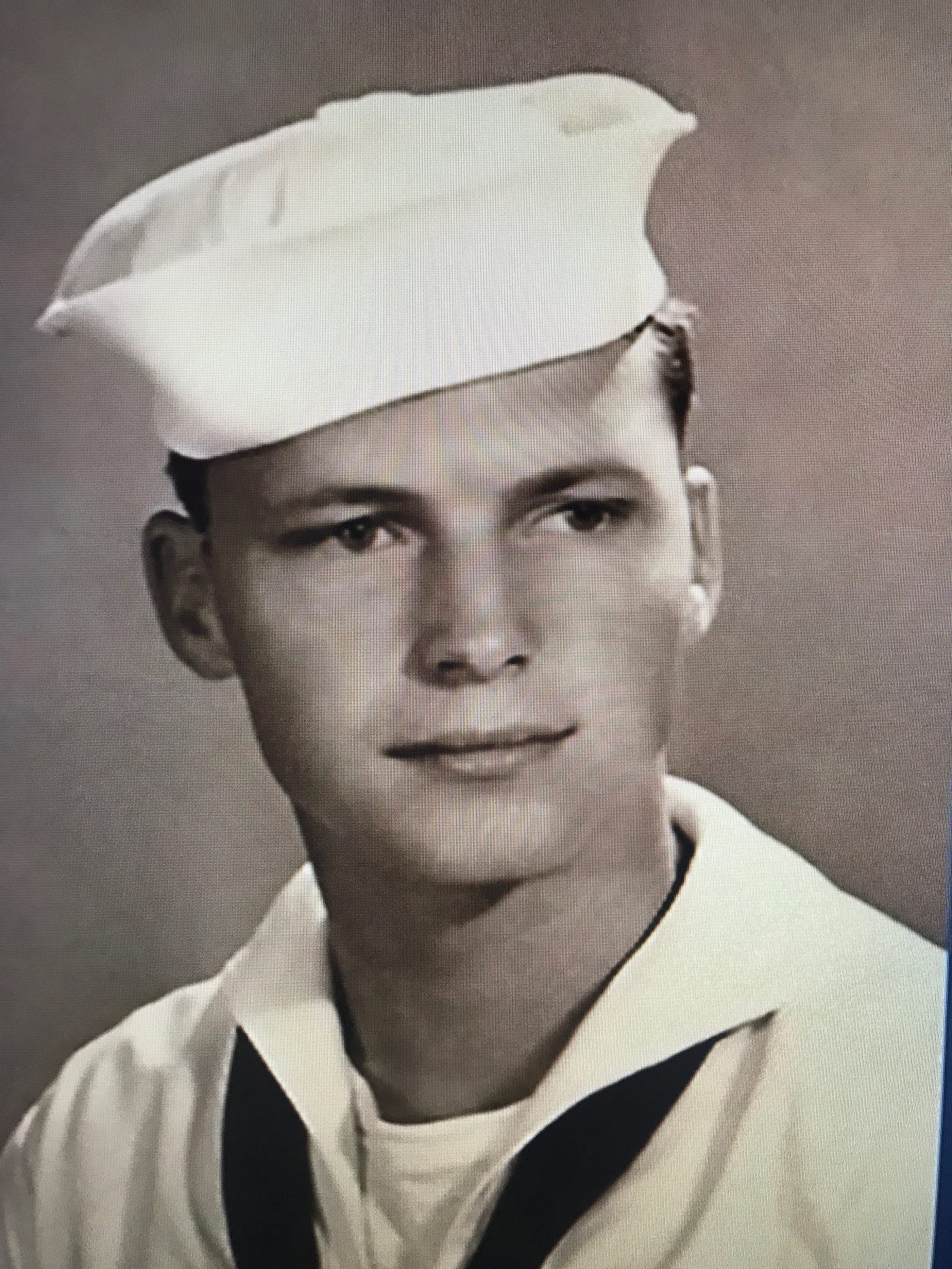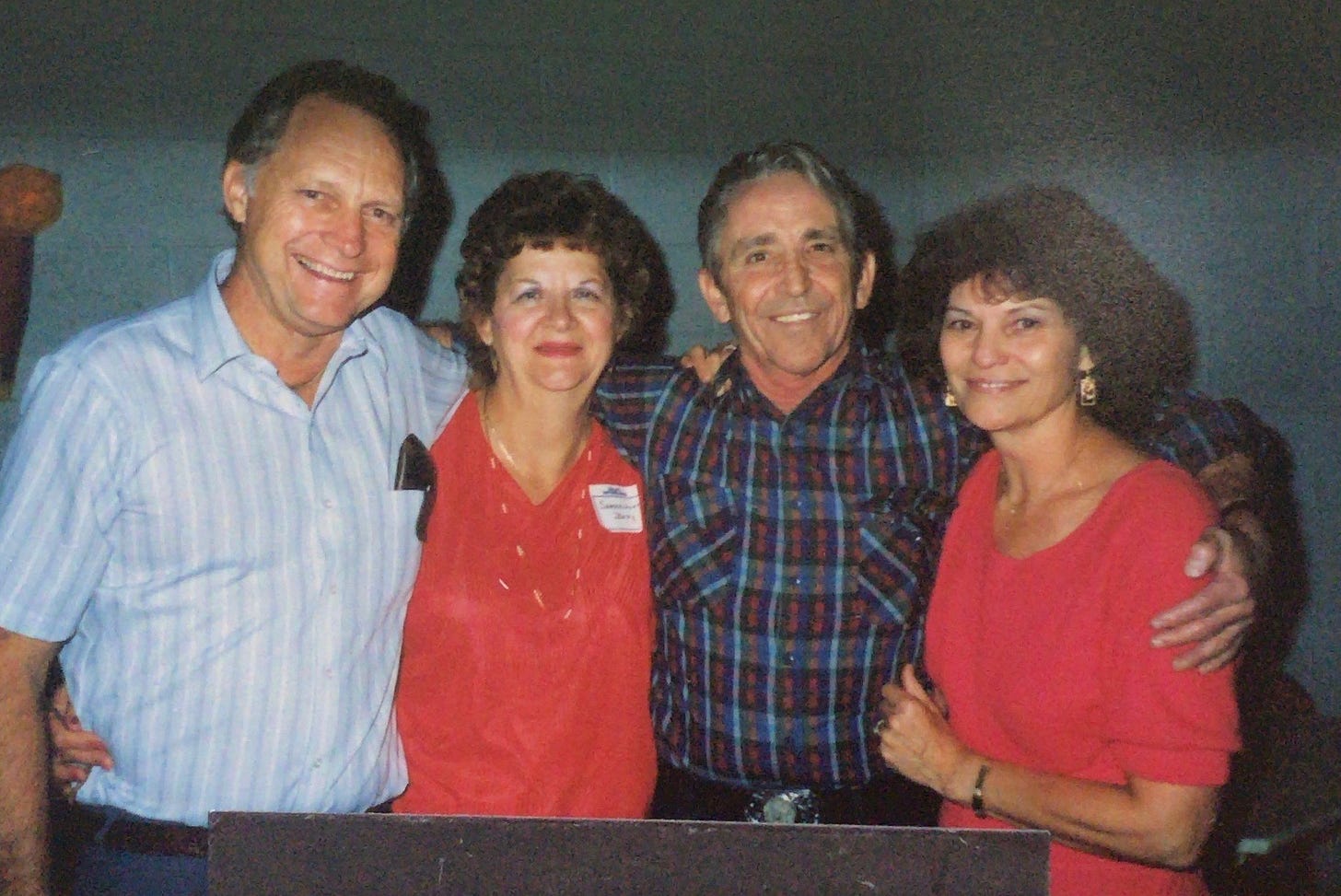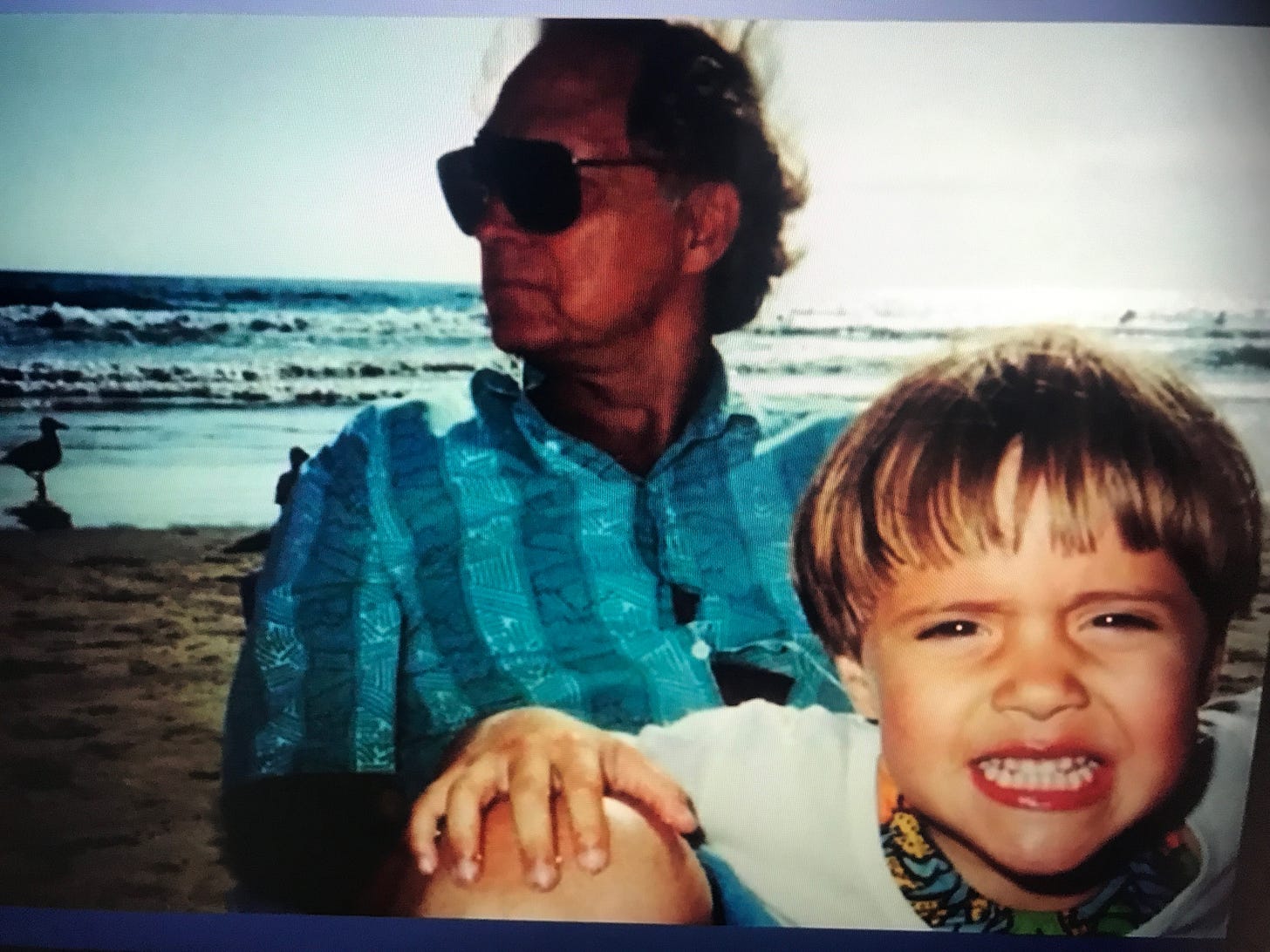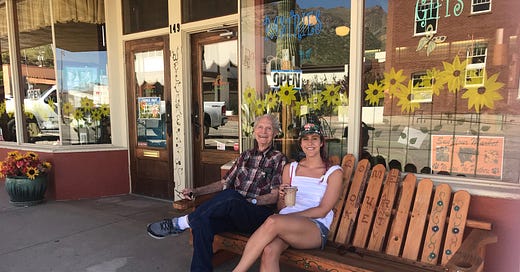My grandpa was 77 when he found love again
Here's what he learned from a lifetime of loss and joy
On the day I called to interview my 86-year-old grandfather, Charles (Chuck) Shackelford, he couldn’t figure out how to open the link to this newsletter that I emailed him. “Should I download it?” he asked. “It’s just a link. You click it,” I said. “It says to download it. Suggested third party...cloud…what do I link it to?” “You just click on it!”
Growing up, I spent a lot of time at my maternal grandparents’ home in Bellflower, California. My grandma Betty would make me waffles with peanut butter and syrup before we watched hours of Rugrats together, and I’d bounce into my grandpa’s home office to play games on his computer and watch him tinker around with the stock market. I’d pick sprigs of mint from my grandmother’s garden and chew on them, and when grandpa would take me on car rides in his gray Cadillac, I’d pull out his giant map book and pretend to give him directions. We spent every Christmas at their home, the busy scene anchored by a tree frocked with tinsel and flooded with gifts, and every year when it was time to go, I’d plead to stay the night until my mom (Jan, their firstborn) would give in. I loved nothing more than being with my grandparents.
Today, my grandpa Chuck lives alone in Florence, Arizona. He was born on the dirt floor of his parents’ humble home in Superior, Arizona, in 1932; when his mother, Jessie, was in labor with him, she sent one of her seven older children to go fetch their father, and delivered baby Charles alone. In high school, he met his future wife of 53 years, my grandma Betty, as well as his future partner, Donnie, and her longtime husband Bob—some 60 years later, after both of their spouses had passed away, Chuck and Donnie would reconnect and start dating. My grandpa has lost many people he’s loved, including his parents, six siblings, a son, his wife, and most recently, Donnie. His three children, five grandchildren and six great-grandchildren still look to him for the wisdom only a lifetime of survival can provide.
Grandpa and me in Superior, Arizona, September 2018
We need to talk
Jillian Anthony: Maybe you can start by telling me a brief history of your life.
Charles (Chuck) Shackelford: You got the questions, I got the answers. Baby of the family. Youngest of six boys and two girls. Preschool and high school in Superior, Arizona. Graduated at 17 and shortly thereafter joined the Navy. I got out before I was 21—what they call a minority cruise—and I was in construction working with a lot of off-duty firemen. They kept trying to get me to sign up for the fire department, which eventually I did. So that was the greatest thing I ever did. I put in 28-and-a-half years, and I’ve been retired for 30 years. That’s about the story.

Chuck in the Navy years
I think you missed a lot, Grandpa. What about your family?
My brother Dave, over in Phoenix, he’s still alive, but he doesn’t drive anymore. And my sweetheart [Donnie] who I lived with here in our new home for almost seven years, she died of lung cancer after a long, hard battle. She died January 6, 2017, and she was 83. We knew each other from high school. As a matter of fact my wife Betty was a playmate of hers down in Bisbee, Arizona, when they were five or six years old, and they all eventually moved up to Superior, so I knew them from school. And I knew her husband [Bob] real well. We was on the tennis team together. They got married early; Big Bob and Donnie was married for 57 years and Betty and I was married for 53 years.

Chuck, Betty, Bob and Donnie
When you say that they got married early, what do you mean by that? Young?
Well, he was 18 and she was 16.
But you got married pretty young too, right?
No, we were both 23.
To me, that’s extremely young.
We lost our third child [Charlie] due to drugs [when he was 27]. That was a ten-year battle which was very difficult. I had to physically kick him out of the house; physically out of the driveway, out of the home, out of the family, done.
What brought you to that point?
We wouldn’t let him stay in the house so he was living in my camper in the backyard. The rules were no more drugs, smoking pot or any of that stuff. And of course, that failed. And he stole my checkbook, stole my credit card, stole my .45 Automatic, and everything got sold for nothing. [Editor’s note: My mother has long told me a story about this time. She was living at her parents’ house, and she had a dream one night that Charlie had stolen their father’s gun. She woke up and asked Chuck, “Dad, do you have a gun?” He said, “Yes, why?” “I had a dream Charlie stole it,” she said. “Go check on it.” He did; it was gone. My mother will never forget the sight of her father physically pulling out his own hair out of frustration, face beet red, veins bulging out of his neck.] He stole a car and ended up in jail, and then he got into the prison ministry and was going to school with his pastor. So he was doing real well, and I thought it was really good. They would let him come home on occasion and then go back. The last episode, you know, he had called me early that day and said he was going to go over and visit a boy. And I tried to tell him, “No, you just come on home. We’ll do our thing here.” And he said, “No, Dad, I got everything covered.” And that was early in the evening and before too late that night, a deputy was knocking on the door to advise us [that Charlie had died of a heroin overdose]. And of course mom went berserk. When you get into that bad stuff that’s the end, you know.
In the years that followed, how did you heal from that loss?
You never get over it. You think about it all the time. I just decided, I’ve got to devote the rest of my days to the rest of the family—that would be my two daughters and my youngest son.
You told me that grandma had said things blaming you [for what happened to Charlie], and I don’t know if you blamed yourself.
Yeah, I absorbed that. That took a toll. But after awhile and going to the shrink and going to church and getting straight with the Lord—same with Donnie, she helped me a lot. We helped each other because her husband had died in ’07, and Betty had died January 1st of ’09 [from a heart attack]. Donnie was always sending cards keeping in touch, and she was really cut from the same cloth, so that’s how we fell in love and bought this new house. We moved here to Arizona from California in 2010 and it was just outstanding.


You rekindled your relationship with Donnie when you were, like, 78?
We were both 77 years old when we put this home together. I bought the house and she made it a home.
After Grandma Betty died, did you think there was a possibility that you would fall in love again?
No. I quit the church, I quit doing everything, and I went into a pretty depressive state. Your mom kind of bailed me out of that, when we got a passport and made a trip to Mexico.
Yeah, I was with you on that trip [to Cabo]. You think that trip cheered you up?
Oh yeah, that really helped. So that was kind of the turning point.
I’d say you took care of grandma for five to ten years, right?
It was quite a few years. Betty had congestive heart failure and had a heart attack and a bypass. It got to the point to where she needed me at home, so I was learning how to be a caregiver. We had our own oxygen carrier in the house, and she couldn’t sleep in the bed. She’d sleep in the chair in the recliner because she couldn’t lay down because her lungs would fill up, so that was very difficult. I’d have to wheelchair her to the car to go somewhere. Then eventually with Donnie it was the same thing. We got to where had to have hospice come to the house.
So you’ve done a lot of caretaking in your life. What was it like for you being that role for two different women?
It was not a problem, because of working in the fire service and all the stuff we did there. You know, I delivered two babies when I was still a recruit basically. [Donnie and I] were 77 when we moved in here. I think she started getting sick in 2015 and it really kind of went downhill fast, but she never complained. She was always more concerned for others and how they were doing than for herself, and eventually we had to get a hospital bed and a shower chair and all that stuff. I was doing most of that stuff myself, helping her shower and get her shots. It got pretty serious there for awhile and her kids would come over and stay in the other two bedrooms, and then we would take turns every two hours during the night to administer her meds and whatever the doctors prescribed.
That must have been really hard to bear witness to.
She confided in me she had never been baptized, and that really stuck with me. So I called a pastor. He came over and she accepted the Lord and he baptized her and we all—Donnie, me, your mom, [Donnie’s kids] and our pastor—we had a regular little church service there and I had communion right in our house. If you can save one soul, that’s worth it.
That meant a lot to you?
Yes. Because I brought two kids into the world with my hands, and I’ve seen two [people] disappear and die in my hands. It’s been a long road.
Is there one piece of wisdom that really helped you get through the hard times?
I just let Jesus in my heart. I really lean on that. That gives you strength, faith. You listen to the Lord and you trust the Lord and then you obey the Lord. You read the scriptures and you try to lead a Christian life. Treat others like you’d like to be treated. For you yourself, Jilly, I pray for you every night.
Thanks, Grandpa. I appreciate it.
I want the best for you. We all go back a long ways.
I’m literally here because of you.
I probably could have done better along the way.
We all do the best we can, right?
Yes, with what we have to work with. We try to keep our heads on straight.

Grandpa and me
If you liked this newsletter, please subscribe and share:
Follow me on:
You are not alone!




